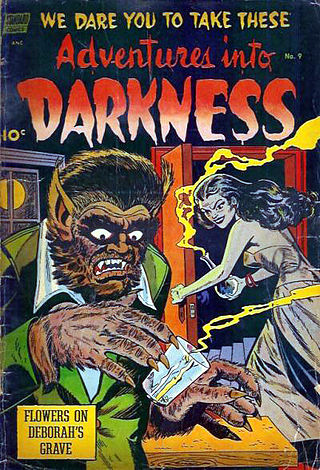A wolf man is a werewolf or lycanthrope.
Contents
Wolf man or Wolfman may also refer to:
A wolf man is a werewolf or lycanthrope.
Wolf man or Wolfman may also refer to:
Abyss may refer to:
Hollywood usually refers to:
Scarface may refer to:

Werewolf fiction denotes the portrayal of werewolves and other shapeshifting therianthropes, in the media of literature, drama, film, games and music. Werewolf literature includes folklore, legend, saga, fairy tales, Gothic and horror fiction, fantasy fiction and poetry. Such stories may be supernatural, symbolic or allegorical. A classic cinematic example of the theme is The Wolf Man (1941) which in later films joins with the Frankenstein Monster and Count Dracula as one of the three famous icons of modern day horror. However, werewolf fiction is an exceptionally diverse genre, with ancient folkloric roots and manifold modern re-interpretations.
Iron Man, Ironman or Ironmen may refer to:
An outlaw is a person living outside the law.
The Stranger or Stranger may refer to:
A scorpion is a predatory arthropod animal.

The Wolf Man is a 1941 American gothic horror film written by Curt Siodmak and produced and directed by George Waggner. The film stars Lon Chaney Jr. in the title role. Claude Rains, Warren William, Ralph Bellamy, Patric Knowles, Bela Lugosi, Evelyn Ankers, and Maria Ouspenskaya star in supporting roles. The title character has had a great deal of influence on Hollywood's depictions of the legend of the werewolf. The film is the second Universal Pictures werewolf film, preceded six years earlier by the less commercially successful Werewolf of London (1935). This film is part of the Universal Monsters movies and is of great cinematic acclaim for its production.
Blaze may refer to:
A demon is a malevolent supernatural being in religion, occultism, mythology, folklore, and fiction.
Midnight is a time of day.
A lone wolf is a wolf not belonging to a pack. As a trope, it refers to an individual who prefers to operate alone.

The Wolfman is a 2010 American period horror film directed by Joe Johnston, from a screenplay by Andrew Kevin Walker and David Self. A remake of the 1941 film The Wolf Man, it stars Benicio del Toro, Anthony Hopkins, Emily Blunt and Hugo Weaving. The film’s story follows an actor based in America who, after his brother's brutal murder, returns to his ancestral homeland in England, where he gets bitten by a werewolf and is cursed to become one.
Ken is a Japanese name which can have many different meanings depending on the kanji used. Ken is also a masculine given name of Scottish / Scottish Gaelic origin. It is used either as a given name or as a short form of names with the letters "Ken".
Joe is a masculine given name, usually a short form (hypocorism) of Joseph.
Wolf is a given name and a surname. It is common among Germanic-speaking peoples, alongside variants such as Wulf. Names which translate to English "wolf" are also common among other nations, including many Native American peoples within the current or former extent of the habitat of the grey wolf.
Cross is an English topographic surname for someone who lived on a road near a stone cross.

Lawrence StewartTalbot, also known as the Wolf Man, is a title character of the 1941 Universal film The Wolf Man and its sequels, created by Curt Siodmak. He was portrayed by Lon Chaney Jr. In the 2010 remake of the film, he is portrayed by Benicio del Toro. The Wolf Man was part of the Universal Classic Monsters ensemble.
The Wolf Man is the title of several horror film series centered on Larry Talbot, a man who upon being bitten by a werewolf becomes one himself, and his subsequent attempts to cure himself of his murderous condition. The franchise was created by Curt Siodmak.